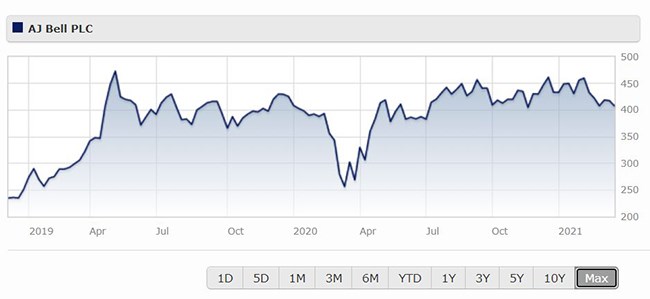
Our latest stock of the week features Britain’s listed Isa providers and our Twitter followers have chosen AJ Bell (AJB) ahead of providers like Hargreaves Lansdown (HL.) and St James’s Place (STJ). AJ Bell is a relatively newcomer to the stock market, floating in November 2018, and offers Isas, Sipps and its own funds direct to consumers and via financial advsiers.
Like other investment platforms, AJ Bell has benefited from the increased interest in trading during the pandemic, and saw customer numbers increase by 30% to 312,309 by the end of December. Assets under administration (AUA), a key metric for platforms, rose 14% to £62.5 billion. For comparison, the UK’s largest platform, Hargreaves Lansdown has around 1.5 million clients, and AUA of £120 billion.
What’s driving this increase in business for UK investment platforms? High volatility in 2020 rattled some investors, who pressed the panic button in the sell-off, but also drew in a new breed of people who enjoy trading the ups and downs. As consultancy the langcat says, the money that younger people in particular are not spending on commuting, drinks and food may be finding its way into the stock market. Langcat ranks AJ Bell as one of the cheapest “DIY investing” providers, especially for those with a smaller portfolio of around £20,000, cheaper than larger rivals Hargreaves Lansdown and Interactive Investor (the pricing dynamic changes when you have £100,000 to invest).

In terms of the share price, retail investors who got shares in AJ Bell’s IPO have been well rewarded: the float price was 160p per share and is now over 411p, a gain of 156%. The shares plunged in March 2020 to 256p in the market sell-off but are now trading at pre-pandemic levels. There was another dip in late May 2020 as fund manager Invesco sold off a £124 million stake after the departure of Mark Barnett, who held AJ Bell in the Invesco UK Equity High Income and UK Equity Income funds.
AJ Bell’s 1%+ yield means that it is held by both income and growth active managers: the company makes up more than 3% of the Neutral-rated Ninety One UK Equity Income fund and around 1.5% of the Silver-rated investment trust Troy Income & Growth (TIGT). From an ESG perspective, AJ Bell is held by a range of sustainable and ethical funds, including Silver-rated Liontrust UK Ethical Fund. With a 5% stake in the company, Liontrust is the second largest owner after founder Andrew Bell, who controls 22%.
Analyst Jonathan Richards at Berenberg says that AJ Bell has delivered “best in class earnings per share growth” in 2020 among listed investment platforms. But he says that this year will see falling transaction revenues, with low interest rates making conditions more challenging, and that the shares are “priced to perfection” at 50 times earnings. Consensus analyst forecasts suggest pre-tax profit of £50.6 million for the 2021 financial year, an increase from £48.6 million last year, rising to £51.4 million in 2022. Dividends per share are expected to be 6.45p in this financial year (to the end of September 2021), up from 6.16 per share last year, and 6.58p in 2022.
Morningstar analysts don’t rate AJ Bell as a company directly but they do have ratings for a number of the firm’s funds via the new Morningstar Quantitative Rating (MQR): for example, AJ Bell Moderately Adventurous Fund has an MQR of Neutral and is rated as 4 stars, which is above the performance of its category peers. Assets under management in this fund division are now over £1 billion, as per the end of January trading update – and the company has just launched the AJ Bell Responsible Growth fund to cater for the growing interest in ESG.


























